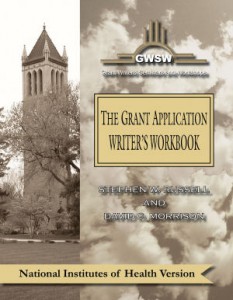Considerable emphasis is routinely placed on the critical importance of frequent publication in peer-reviewed journals; preferably those with high impact (i.e., those journals with high Impact Factors). Yet, at the same time, and for a multitude of reasons, achievement of this goal has become increasingly challenging for most would-be authors…
ACCESS EARLIER POSTS
RELATED TO:
GWSW Workbooks offer comprehensive, step-by-step instruction for creating proposals for a variety of funding agencies.
MOST RECENT NAT’L SCIENCE FOUNDATION (NSF) RELATED BLOGS
The growing dilemma with the biological/biomedical publication enterprise
Part 2: Dangerous words to avoid in grant applications
Probably among the most commonly used words in grant proposals is the verb/noun “(to) understand”. Applicants very frequently plan grant applications that have been designed to “understand” something, whether an explanation for a certain social phenomenon, a biochemical pathway, clarification of an as yet to be identified series of observations, or even a way to explain the underlying reasons for a given historical event. Thus, how common it is to read: “The objective in this proposal is to understand the underlying reasons for…”. Alternatively, there are those applicants who feel it important to be…
Part 1: Dangerous words that should be avoided in grant proposals
Two words that should usually be avoided by applicants in preparing their grant applications are “IF” and “WHETHER”. These words represent distinct manifestations of the same concept, since “If” implies “It might or it might not”, and “Whether” always provides for the option “Whether or not”. The primary problem with their use is that they both provide opportunities for a negative outcome to occur. While it is certainly possible that either a positive or an alternative…
Are you thinking about an NSF CAREER Award application?
If so, is your application designed in such a way that it indicates that you really appreciate its purpose? We would suggest that this is not a trivial question, particularly given the relatively intense competition for these awards. As a consequence, low overall success rates (# awards/# applicants) are, accordingly, often considerably lower than for standard NSF grants. It makes great sense that any applicant considering applying for an NSF CAREER award should…
Would you like to hone your proposal writing skills?
Experienced applicants, reviewers and funding agency officials generally agree that of the best ways to become a better proposal writer is to serve as a reviewer of proposals and most federal funding agencies provide opportunities to do this. The underlying reasons for being proactive in seeking out such opportunities are multiple. First, you will have the opportunity to observe the review process “up close and personal” which is likely to radically…
A recent “Ask the Experts” from a reader re: NSF Program Officer
“Dear GWSW,
I recently heard back from the NSF ECR program officer on my Overview and Objectives section and, while she did agree that the proposal was appropriately theory-focused, she had serious reservations regarding the unique contribution of my proposal (i.e. ‘the area is already well covered by other applicants’). I followed up with more details on the data and methodology of my study and…

